📽️ Review of "La Dolce Vita" [ENG-ESP]
7 comments
[...drinking until forgetting, sleeping with anyone, chasing fame, art, love, and finding infinite nothingness...]
It wasn't Anita Ekberg's nude scene in the Trevi Fountain—they did that even in the local movie theaters. It was something else, something deeper, more poisonous: the revelation that God had died, but we were still dancing on his grave. La Dolce Vita, Fellini's masterpiece, was first cursed. And then, a classic.
I invite you to check out this film, which is part of my series "10 Films That Shook the World." I'm happy to publish an analysis on #hive.
This is my fifth installment. If you're interested in knowing which were the first four I talked about, I'll leave the links at the end of this post.
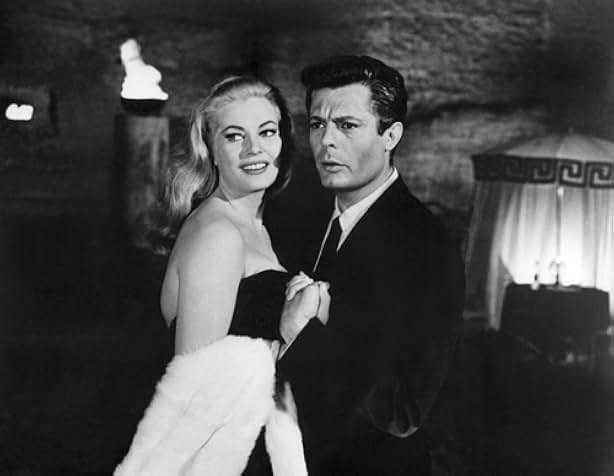
As a writer, I've always been obsessed with what hides behind the glitter, let's say the cookies on the marble of statues or the natural scent beneath expensive perfumes. And believe me when I tell you, few films have scratched that crust of false elegance as savagely as Fellini's La Dolce Vita, which, more than a film, is like a crossroads broken into smaller, broken crossroads, where we all find ourselves, sooner or later, with our miseries exposed.
My childhood family cinema was the shadows I projected from the moon against the walls of our humble homes back in the marabuzal forest. It's impossible for me to know for sure when I'll first speak about this film. It must have been in the 1980s when I was in college. There was a short professor who took the podium and lectured like an immaculate bishop. If memory serves, I had brought that film to demonstrate that more than a work of art, it was a filmed heresy.
Later I learned that the Vatican had condemned it, that Spain had banned it, and that, of course, made it irresistible. What did Fellini show that made them tremble, a man of cassocks as much as the narrow-minded people who rule the world?
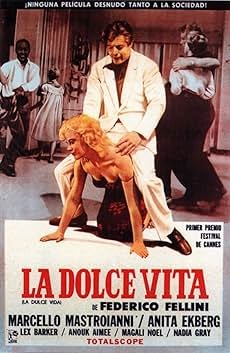
When I finally saw it, I understood the scandal. It wasn't the sex that was disturbing, but the truth. Fellini didn't film a story, but a state of mind: the emptiness hidden behind every forced laugh, every drunken kiss, every party that never ends because no one wants to go home to face the silence. Sadness.
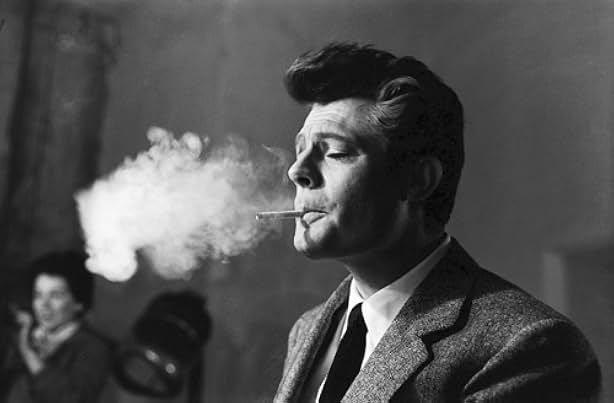
The film begins with Christ flying over Rome, hanging from a helicopter like a neon sign. The sacred transformed into spectacle. Marcello, the journalist played by Mastroianni with that mixture of boredom and despair that only great actors can convey, doesn't even look at the Redeemer. He's busy flirting with bikini-clad girls, shouting for their phone numbers, while the helicopter takes God away without anyone noticing. Brutal. Iconoclastic. Provocative.
That's La Dolce Vita: a procession of ghosts in evening dress. Maddalena, the bored heiress who sleeps with Marcello in a prostitute's house, whispers promises that neither of them intends to keep. Sylvia, the Hollywood star who shines like a diamond, fake, radiant on the screen, and empty. Steiner, an intellectual who seems to have it all—family, culture, prestige—and ends up shooting himself after killing his children. And Emma, poor Emma, crying in the bathroom of someone else's apartment, begging Marcello to love her, even out of pity.
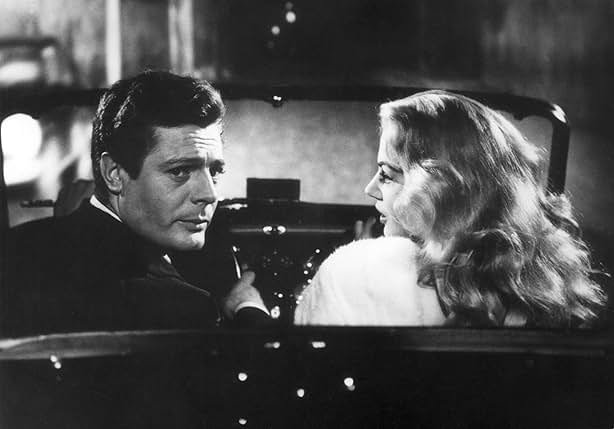
Rome looks like a neon-lit corpse. Fellini films it like a burning circus: parties in decadent aristocratic mansions, gossip-hungry journalists, children who see a woman "possessed" by the Virgin and turn her into a tourist attraction. Even Nino Rota's music, so cheerful on the surface, hides a lament. It's the soundtrack to a wake where the guests don't know they're the dead.
Fellini doesn't judge. There's no need to. He shows: Marcello drinking himself to forget, sleeping with anyone, chasing fame, art, love, and finding infinite nothingness. The final scene, after the orgy on the beach, when the young woman from the café smiles at him from the other side of the stream and he can't hear her, can't cross, can't even understand his own name... is one of the most heartbreaking in cinema. There is no redemption. No moral. Just the indifferent sea and the remains of a dead jellyfish on the sand. Beyond brutal!
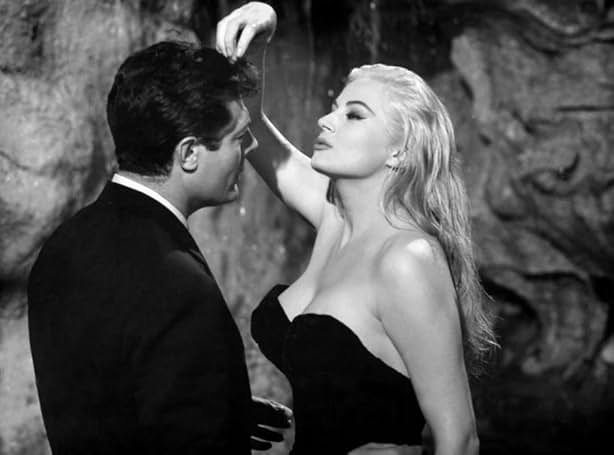
Obviously Fellini is the soul of this film, but it's impossible not to mention Marcello Mastroianni in this review, with his natural charisma and ability to convey melancholy and confusion. His greatness is such that he created an iconic character to the point of becoming synonymous with auteur cinema. Anita Ekberg, as the dazzling Sylvia, brought a magnetic presence and a glamour that continues to dazzle despite the passage of time. Nino Rota's score is, without exaggeration, one of the great musical achievements in cinema.
I don't like to compare works of art because any comparison is usually unfair. But I think this work, like no other, showcases Fellini's intellectual maturity, managing, like no one else of his time, to fuse reality with fantasy and satire with the profoundly human.
Such is its majesty that other directors, obviously influenced by him, have taken on the task of exploring narrative fragmentation and moral ambiguity. Only few have managed to capture the essence of an era and the complexity of the human soul as the Italian did.
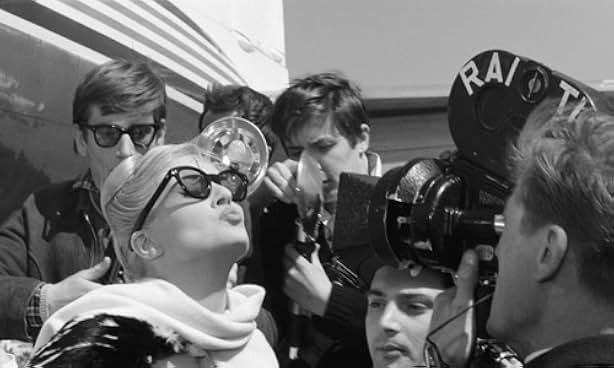
Censorship called it pornographic. Critics called it revolutionary. We go through life drunk on dreams that never come true, chasing ghosts at other people's parties, believing that the next drink, the next kiss, the next movie will fill that hole in our chest. And in the end, like Marcello, we're left on a beach, not understanding why the sweet life tastes like ashes.

[...bebiendo hasta olvidar, acostándose con quien sea, persiguiendo fama, arte, amor, y encontrando la nada infinita...]
La Dolce Vita
No era el desnudo de Anita Ekberg en la Fontana di Trevi, eso lo hacían hasta en los cines de barrio, era otra cosa, algo más profundo, más venenoso: la revelación de que Dios había muerto, pero seguíamos bailando sobre su tumba. La Dolce Vita, la obra maestra de Fellini, primero fue maldita. Y después, un clásico.
Te invito a acercarnos a esta cinta que forma parte de mi ciclo "10 películas que estremecieron al mundo". Análisis que con todo gusto estoy publicando en #hive
Esta es mi quinta entrega. Si te interesa saber cuáles fueron las cuatro primeras de las que hablé, te dejo los enlaces al final de este post.

Como escritor siempre me ha obsesionado lo que se esconde detrás del brillo, digamos que las galletas que hay en el mármol de las estatuas o el olor natural, bajo los perfumes caros. Y créeme cuando te digo que, pocas películas han arañado esa costra de falsa elegancia con tanta saña como La Dolce Vita, de Fellini, que, más que una película, es como una encrucijada rota en pequeñas encrucijadas más, rotas, donde nos vemos todos, tarde o temprano, con nuestras miserias al descubierto.
Mi cine familiar de la infancia eran las sombras que proyectaba a la luna contra las paredes de nuestros humildes hogares allá en el marabuzal. Me es imposible saber a ciencia cierta cuándo voy a hablar por primera vez de esta película. Debió ser en los años 80 cuando estaba en la universidad. Había una profesora de baja de estatura que subía al estrado y dictaba las clases como un obispo inmaculado. Si la memoria no me falla había llevado aquella película para demostrar qué más que una obra de arte, era una herejía filmada.
Después supe que el Vaticano la había condenado, que España la prohibió, y eso, claro, la volvió irresistible. ¿Qué mostraba Fellini para que temblaran, lo mismo hombre de sotanas que las estrechas mentes que rigen el mundo?

Cuando por fin la vi, entendí el escándalo. No era el sexo lo que molestaba, sino la verdad. Fellini no filmaba una historia, sino un estado del alma: es decir el vacío que se esconde detrás de cada risa forzada, cada beso borracho, cada fiesta que no termina porque nadie quiere irse a casa a enfrentar el silencio. La tristeza.

La película empieza con Cristo volando sobre Roma, colgado de un helicóptero como un anuncio de neón. Lo sagrado convertido en espectáculo. Marcello, el periodista interpretado por Mastroianni con esa mezcla de hastío y desesperación que solo los grandes actores saben transmitir, ni siquiera mira al Redentor. Está ocupado coqueteando con unas muchachas en bikini, pidiéndoles su número de teléfono a gritos, mientras el helicóptero se lleva a Dios sin que nadie lo note. Brutal. Iconoclasta. Provocador.
Así es La Dolce Vita: una procesión de fantasmas con traje de gala. Maddalena, la heredera aburrida que se acuesta con Marcello en la casa de una prostituta, susurra promesas que ninguno de los dos piensa cumplir. Sylvia, la estrella de Hollywood que brilla como un diamante, falso, radiante en la pantalla y vacía. Steiner, un intelectual que parece tenerlo todo—familia, cultura, prestigio—y termina pegándose un tiro después de matar a sus hijos. Y Emma, la pobre Emma, llorando en el baño de algún apartamento ajeno, rogándole a Marcello que la ame aunque sea por lástima.

Roma parece un cadáver iluminado con luces de neón. Fellini la filma como un circo en llamas: fiestas en mansiones aristócraticas, decadentes, periodistas hambrientos de chisme, niños que ven a una mujer "poseída" por la Virgen y la convierten en atracción turística. Hasta la música de Nino Rota, tan alegre en la superficie, esconde un lamento. Es la banda sonora de un velorio donde los invitados no saben que los muertos son ellos.
Fellini no juzga. No hace falta. Muestra: Marcello bebiendo hasta olvidar, acostándose con quien sea, persiguiendo fama, arte, amor, y encontrando la nada infinita. La escena final, después de la orgía en la playa, cuando la joven de la cafetería le sonríe desde el otro lado del arroyo y él no puede oírla, no puede cruzar, no puede entender ni siquiera su propio nombre... es de las más desgarradoras del cine. No hay redención. No hay moraleja. Solo el mar, indiferente, y los restos de una medusa muerta en la arena. ¡Más que brutal!

Obviamente Fellini es el alma de esta película, pero es imposible no mencionar en esta reseña a Marcello Mastroianni, con su carisma natural y su capacidad para transmitir la melancolía y la confusión. Es tanta su grandeza que creó un personaje icónico al punto de convertirlo en sinónimo del cine de autor. Anita Ekberg, como la deslumbrante Sylvia, aportó una presencia magnética y un glamour que qué sigue deslumbrando a pesar del tiempo. Nino Rota en la banda sonora es, sin exagerar, uno de los grandes logros musicales del cine.
A mí no me gusta comparar las obras de arte porque toda comparación suele ser injusta. Pero creo que esta obra, como ninguna, exhibe la madurez intelectual, de Fellini, al lograr como nadie, hasta su tiempo, fusionar la realidad con la fantasía y lo satírico, con lo profundamente humano.
Es tanta la majestuosidad que otros directores, obviamente influenciados por él se han dado a la tarea de explorar la fragmentación narrativa y la ambigüedad moral. Solo que pocos han logrado captar la esencia de una época y la complejidad del alma humana cómo lo hizo el italiano.

La censura la llamó pornográfica. Los críticos, revolucionaria. Vamos por la vida borrachos de sueños que nunca se cumplen, persiguiendo fantasmas en fiestas ajenas, creyendo que la próxima copa, el próximo beso, la próxima película, nos llenará ese hueco en el pecho. Y al final, como Marcello, nos quedamos en una playa, sin entender por qué la dulce vida sabe a cenizas.
🎯 Aquí puedes leer la saga "Diez películas que estremecieron al mundo"

📌 © Copyright 2025 Argenis Osorio. Todos los derechos reservados/© Copyright 2025 Argenis Osorio. All rights reserved
📌 Imágenes del sitio oficial de IMDb/Images from the official IMDb site

Soy autor de los libros de Narrativa: Convite de Cenizas (2002), Tras la piel (2004), En este lado de la muerte (2014), El orden natural de las cosas (2015), La Sangre del Marabú (2020), La Sexta Caballería de Kansas (2024) y La Nada Infinita (2024)

Consider following our trail on HIVEVOTE by clicking on the image below. We thank all our supporters.

To all of you artists out here at HIVE! If you ever are lost, please join Bokura No Digital World at our Discord chat.



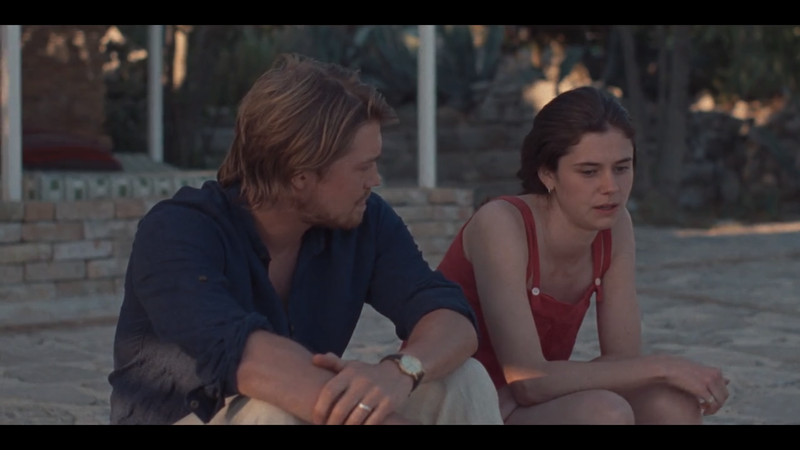
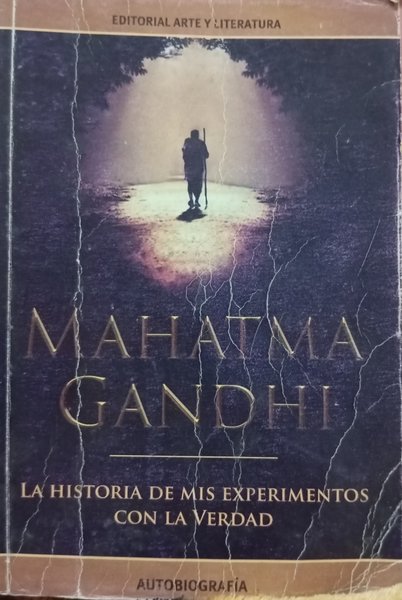
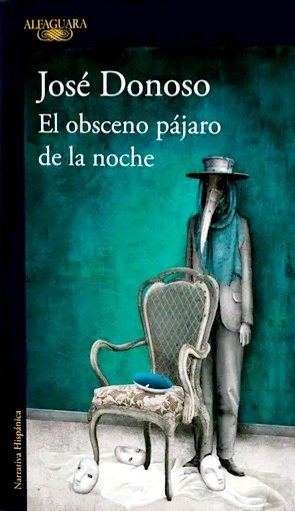

Comments